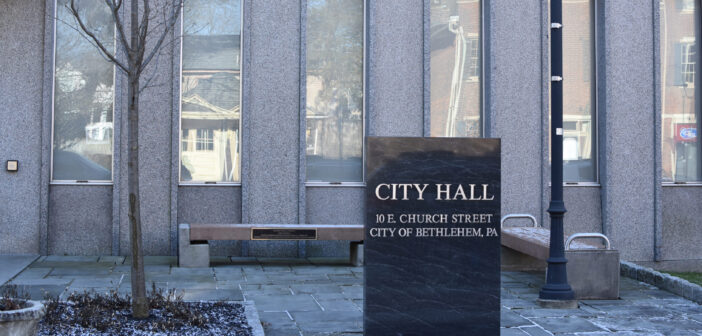Concerned Bethlehem citizens joined together in asking the local government to enact a comprehensive ethics ordinance that would eliminate financial conflicts and promote transparency.
Bethlehem resident Barbara Diamond aided the efforts starting in 2015 when the public became aware of the ethical concerns involved in the rezoning of Martin Tower. She said the City Council appeared to be partial to developers, voting to help themselves financially, and some citizens wanted this addressed.
After filing a Right-to-Know request, Diamond found the city only had an aspirational ethics plan but no law was passed.
While the group’s efforts were ultimately unsuccessful at the time, they were not forgotten. In November, City Council unanimously passed an anti-conflict of interest ordinance.
The ordinance requires all council members, members of city boards and authorities, and most other city officials to exclude themselves from voting on matters in which they have a financial interest.
This financial interest is defined as a $500 campaign contribution or 10% investment to ownership of a business. These financial interests extend to family members, as well.
City Councilwoman Paige Van Wirt, who first introduced the ordinance in June, said the specific guidelines were chosen after comparing ordinances across the country and Pennsylvania. A $250 limit was initially proposed.
She said although voters are meant to be a check on government, the City Council realized it was not working this way and official law needed to be enacted.
“If we as a council can separate our campaign donations from the way we vote, we will reestablish the faith of our voters and our citizens in the fact we are operating in their best interest and not our own,” Van Wirt said.
She said the primary goal of the ordinance was to clearly see campaign contributions and assess the financial interests of local politicians.
Specifically, the tenure of development happening in South Bethlehem brought a shift in these agendas.
“The casino changed everything in terms of being able to turn around South Bethlehem, and it suddenly became this hot commodity,” Van Wirt said. “There were a lot of developers that were very close to people in city government, and I think there was a general feeling from the public that there was too much closeness and not enough transparency.”
Van Wirt said the unanimous support was possible due to a series of Committee of the Whole meetings, where the public and council members can ask questions and observe the merit of the ordinance.
Michael Colón, president of City Council, said the ordinance eliminates the questioning of members’ motives.
A member of the council for eight years, Colón said he understands that with any law, the “devil is in the details.”
“I can’t say donor X gave politician Y, Z number of dollars, and that’s why politician Y votes the way they do,” Colón said. “But with that being said, when 100% of politicians say their campaign donations have no bearing on voting…somewhere that money has influence.”
He said the ordinance was easy to support because of Van Wirt’s singular approach to the clear issue: limiting public perception of conflict.
Diamond hoped for a more comprehensive ordinance, however.
As a third-class city, defined as any municipality of less than 250,000 people with a city government, Bethlehem did not have an ethics program included in their home charter. Nearby home-rule cities Philadelphia, Easton and Allentown, however, have ethics programs included in their home-rule charter, which are enforced by law.
“What you’re trying to do is practically impossible because you are expecting elected officials to curtail their prerogatives, and that is just not going to happen,” Diamond said.
But, Diamond said she applauds Van Wirt and the council for moving forward with the ordinance. She said Van Wirt has carried through with creating higher ethical standards than has been achieved in the past.
Diamond said she also commends Colón’s courage in “going against the grain” as a new council member in 2025, alongside City Councilwoman Olga Negrón.
Marietta Sisca, ‘23, president of the College Republicans at Lehigh, said she was surprised a similar ordinance did not already exist in Bethlehem.
“In light of recent property acquisitions, such as the church on Packer Street, this ordinance would require members to sit out of any votes concerning Lehigh’s actions in the community,” Sisca said.
She said she thinks Lehigh should refrain from donating to any members of City Council because of its status as a private institution. She said money from tuition and endowments should be prioritized for helping the university itself and not local politics.
Sisca said any amount of money could be a potential conflict of interest. Overall, she remains hopeful of the ordinance’s impact in the future and said it has good intentions to move local government in a more ethical direction.
For Diamond, it is hard to not feel pessimistic about the ordinance when weighing what can be done against what should be done.
“For it to make a difference, there has to be more cognizance on the part of city council members as more awareness and consciousness is raised through education and training,” Diamond said. “Recusal is important, but before that, you and your fellow members of the city admin need to be aware of your conflicts when they arise.”
Van Wirt said the ordinance, in reality, is not meant for the current council, but instead for the future. She said she hopes citizens and council members will be bound by these constraints and held accountable.






Comment policy
Comments posted to The Brown and White website are reviewed by a moderator before being approved. Incendiary speech or harassing language, including comments targeted at individuals, may be deemed unacceptable and not published. Spam and other soliciting will also be declined.
The Brown and White also reserves the right to not publish entirely anonymous comments.